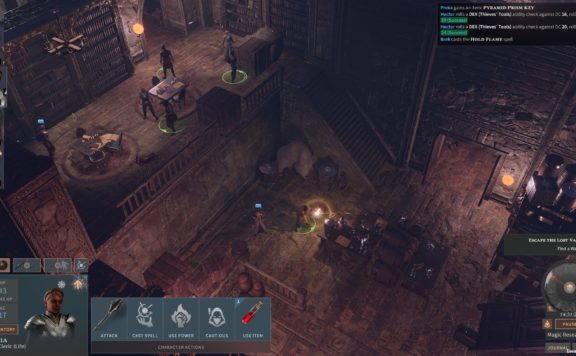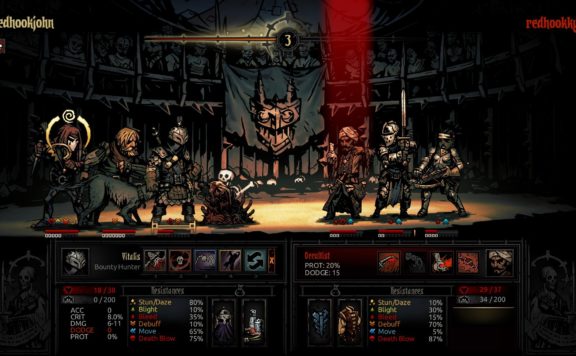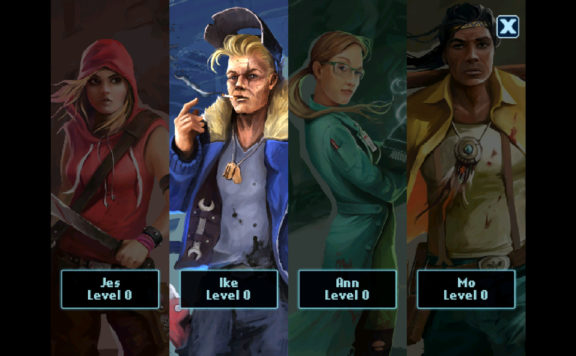When Tyranny launched, no one could have expected its story to be so dark, malicious, yet oddly humble and introspecting. The RPG from Obsidian, makers of Pillars of Eternity and the forthcoming Pillars of Eternity 2, represented a departure from the norm for the game maker. Tyranny is a game where the player is evil, no bones about it. How evil, and how malicious, are up to you, but you’re the acting pawn of a Tyrannical overlord. You don’t have a lot of wiggle room. Tyranny challenged players with choices that were never easy, and as a result became one of recent memory’s most unique role-playing experiences. This is our Tyranny Postmortem interview with Obsidian’s own writer Matt MacLean.
Tyranny had a pretty big launch, and seems to have earned quite a devoted following. What are some of the highlights for you, looking back now?
I’ve been very thankful for the reception the game has received. While Tyranny borrows heavily from the gameplay of Pillars of Eternity, it’s a brand new story in a brand new world with no movies or books out there to give players some introduction. We certainly assumed out target audience is up for some reading, but our game’s opening sequences are a still a lot of to ask for a new player to digest, and it’s a relief to know we didn’t strangle the player with text – lovingly choked maybe. And while some feedback online seems to suggest some players played the game once and assumed how they played it is the only thing the game ever has to offer, it’s rewarding to see a large number of players discussing their repeated and varied explorations of the game.
When I think about feedback I was most relieved to see, I’m glad to know that a fair number of players are enjoying Tyranny’s sense of mystery and speculating on things to come. The game is filled with liars, unreliable helpers, and some characters and subjects are left largely to the player’s speculation. Some players will find the lack of answers unsatisfying, but I’m glad a great many players enjoy the questions raised and I’ve seen numerous players post online about their thoughts and theories. I’ve even seen a handful players have successfully sussed out Kyros’ motivations throughout the game despite there being no place in the game that tells you what it is in no uncertain terms.
What are two lessons you learned that you made take with you moving forward and into Pillars of Eternity 2?
There is some balance to good choice design that is maybe 80% planned 20% improvised – that’s pretty vague but it’s something that’s come out of working on Alpha Protocol, New Vegas, and now Tyranny – all choice heavy games that shipped with a fun mix of things we planned for early on, and cool things we we couldn’t have thought of until we were in full swing. Ideally, you have ALL your choices known and planned out so that every developer on the team knows all the permutations to tackle, and each developer has a box within which they can paint some flair and not muck up events down the line. But I don’t think it’s possible to know all the choices at the planning phase – a lot of the best moments come out of QA suggestions or designers working on an area and realizing there’s a way better answer than what we thought of ages ago, when we were thinking big picture, no finite details.
But if your game is a complex web of choices, any change can ripple and explode the game and you just can’t realistically make a game wherein each person is adding in fun choices into the moments they’re working on without regard for what comes before/after/in parallel. So a lot of keeping the game together is saying no to ideas that send the player too far from the mark, and trying to think of fun choices and permutation that provide for cool moments without derailing the plan.

So while I don’t know what the magic recipe is, I think any choice-heavy game requires intense planning at the start, while permitting for additional choices as the developers start fleshing out the game and have the chance to play the build and be in the player’s shoes for a bit. This means focusing on the big decisions early on and being willing to leave some TBD blanks that come with constraints, not open-ended requests for content (such as, we know the player will go to this location – they can kill anyone or anything but just make sure they have a chance to learn X detail and be offered Y quest (even if they say no)). This also means heckling your coworkers when they forget to provide verbose comments to their global variables.
The other lesson would be the value in trying to scale text to the player’s level of buy-in with text. I wouldn’t say Tyranny accomplished this at every point in the game, but we generally provide you with the ability to stop and read a lot or spam the ‘1’ key and breeze through conversations (while picking up what you need to know from quest objectives). We outsourced a lot of exposition text into mouse-over text and when combined with having (on average, at least compared to Pillars of Eternity) fewer words per ‘page’ of conversation, this helped give Tyranny brevity for those who wanted it, and verbosity for those seeking more. Tyranny is also a good object lesson in the value of providing ‘no answer’ as a valid answer- for better or worse, it seems the most memorable line I have/will ever write is “[Glare silently.]”.
One of the things that stood out about Tyranny is how the story is very different from the normal RPG narrative. What is the biggest difference you now see with the game in the player’s hands?
The largest point of departure from the ‘standard’ RPG narrative was our attempt to move away from the assumption of the problem solving hero. Most RPGs are power fantasies (even if they are science fiction speculative fantasies of kicking ass, they are fantasies) and you can usually safely assume that your actions are righteous, that anything the game lets you kill is evil (and anything that’s good, the game won’t let you kill), that every effort makes things better, that NPCs can’t give you misleading information, that karma generally rewards goodness and punishes evil – not every game plays by these rules 100%, but I feel I can safely generalize most RPGs on these terms.
Tyranny aims to immerse the player in evil, and that means the NPCs around the player believe themselves to be righteous but rarely have the player’s best interest in mind, and this changes some of the fundamental dynamics of how RPGs work. Many of the major characters lie to you (or tell you facts that are half true but laced with a lie to steer you toward an outcome). Many of the quest givers will use you for free if you let them, and will only actually pay you if you ask in advance what the trouble is worth. In many ways, we dialed a lot of this back for user friendliness. For instance, for narrative reasons, it made sense to have companions abandon the player over certain decisions but with companions so tightly wound to the combat experience, it made sense to dial back the number of instances and ways the player could alienate the companions from your party permanently, and when it does come up, we were rather generous about reducing these moments or adding ways for the player to talk their companions out of leaving.

We have not seen a blog post in a while, how are things going on updates with the game… hint hint?
Are you trying to get me to confirm or deny a sequel or expansion? Nice try, but you’ll never get me to discuss our “Adventures of Young Old Man Mua” expansion.
You created some epic companions to join in the dark quest, are there any plans to add more to the game?
No. If there were plans to add more stuff (is that enough plausible deniability?), there’s plenty we’d do with the current cast of companions. The only thing I’d want to add is something nobody would really think the game needs – some sort of co-dependent mime that is dialogue-free and mimics your already-existing animation set but off by a half second and maybe with some motion blur to complete the absurdity of it all. So unless Paradox gets flooded with emails demanding a BattleMime™, safe to say the answer is no.
Tyranny presents a rich in depth world with lots of factions, are there plans to add more to the game?
The game already asks you to get on board with a lot of make believe factions in a short span of time. If we’re lucky enough to make a sequel, we’d have new factions for sure – there are dozens of Archons under Kyros’ control, most with their own armies, guilds, cults – but the game as it is has enough moving parts and needs more people of the existing factions, not more factions.
There’s also a question of math and what works best. If you’re trying to make a fun encounter/conversation/quest/whatever, it’s much better to work with the same reputation bars, global variables, old ideas you were kicking around, and such – especially if you’re like me and every day have a gallon of info poured into a shotglass of a brain and deal with a ton of spillage, it’s better to do more with the moving parts you have than to add things for the player to learn and for the game to pay out with varying consequences.

Obsidian continues to deliver some amazing classic CRPGs in a new age. What keeps the studio going, and what keeps you true to that goal?
I can think of three things the studio does rather well. The first is active collaboration – any team endeavor at Obsidian benefits from not just its principle elements, but everyone else at the studio that is passionate and invested in the success of the end goal. From my own point of view, as the lead narrative designer I had only a trio of folks officially assigned to me but that belies that actual brainpower it took to make this all happen. Also at my disposal was a dedicated QA team that acted as editors, and other developers on other teams that would play the game and give meaningful feedback and excellent suggestions.
The second thing Obsidian does well is transparency of process – at least in the design department, you can’t get through the day without becoming familiar with what the programmers or artists do and how they do it. That’s not to say we all become experts in art or programming (quite the opposite, if there’s anything I do well it’s listening to programmer and artists instead of telling them what to do) but we all become familiar with each other’s burdens and that helps us make smart design decisions because we have a better sense of what’s generally easier to add and what’s usually harder. Disconnects happen, of course, but the studio fosters a sense of getting to know the other classes in the party, so to speak, and I think we do a solid job of knowing how best to leverage our collective talents.
Third, I think the company benefits from having a diverse group of gamers among the staff (including people who don’t play games at all – you don’t want a studio full of game developers to suffer from this malady, but a few game atheists provide essential feedback on issues that, as an avid gamer, you’ll never see coming) and it’s not just RPGs that we all play. If I had to compose a book of X number of habits of successful game developers, the really good ones play all sorts of games and find merits and flaws in games of any quality or genre. I know I ignore people in my life and chores and such to play video games but despite what I think is an obsession with games, I’m only enjoying/exploring a small slice of what’s out there. I’ve learned a ton from games I’ve never played thanks to having a coworker share with me some element of these games that they loved/hated. If all of us just went home and played Mount and Blade every night, we’d A) get nothing done because everyone would be too busy joining my warband or dying and B) have a much narrower understanding of what’s out there.







